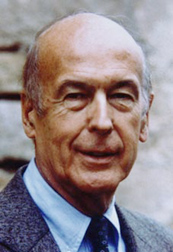|
|

| |
| Office: | President of France |
|---|---|
| Term in office: | From May 19, 1974 to May 10, 1981 |
| Preceded by: | Georges Pompidou or Alain Poher (interim) |
| Succeeded by: | François Mitterrand |
| Date of birth: | February 2, 1926 |
| Place of birth: | Koblenz, Germany |
| First Lady: | Anne-Aymone Sauvage de Brantes |
| Party: | Union for French Democracy |
Valéry Marie René Georges Giscard d'Estaing (born February 2, 1926 in Koblenz, Germany) is a French politician who was President of the Republic from 1974 until 1981.
Today he is involved with the European Union and one of the fiercest proponents of the United States of Europe. He is also very much against Turkey joining the European Union, saying to French Newspaper Le Monde, "In my opinion, it would be the end of Europe."
| Contents |
Biography
Giscard is the son of Edmond Giscard d'Estaing (1892-1982), a French civil servant, and his wife, May Bardoux, who was a daughter of French senator and academicien Jacques Bardoux and a great-granddaughter of French minister of state education Agénor Bardoux.
He studied at Lycée Blaise-Pascal in Clermont-Ferrand, Ecole Gerson and Lycées Janson-de-Sailly and Louis-le-Grand in Paris. He graduated from the École Polytechnique and the École nationale d'administration (1949-1951).
Elected in Parliament, as an "independent" (i.e. conservative) in 1951, he was secretary of state for Finances from 1959 to 1962, then minister of Finances and Economic Affairs from 1962 to 1966 under prime minister Georges Pompidou, then minister of Economy and Finances under prime ministers Pierre Messmer and Jacques Chaban-Delmas from 1969 to 1974.
Presidency
Head of pro-gaullist conservatives from 1962 to 1974, he created in 1978 the UDF (Union for French Democracy) in which christian-democrats and conservatives merged.
Giscard was defeated in the French Presidential Election of 1981. From 1986 until 2004 he was the president of the regional council of Auvergne.
Valéry Giscard d'Estaing was a friend and loyal to the former Central African Empire's emperor Jean-Bédel Bokassa , he supplied the regime with much financial and military backing.
Later career
Following from his defeat in the regional elections of March 2004, he decided to leave partisan politics and to take his seat in the Constitutional Council as a former president of the Republic. From 2002-2003 he served as President of the Convention on the Future of Europe.
On 29 October, 2004, the European heads of state, gathered in Rome, approved and signed the European Constitution based on a draft strongly influenced by Giscard's work at the Convention.
In 2003, Valéry Giscard d'Estaing was admitted to the Académie française, amid controversy; critics pointed out that Giscard had written only a single novel, Le Passage, of dubious quality.
He is currently serving as:
- President of the CEMR (Council of European Municipalities and Regions)
- A member of the Académie française (French Academy)
- As a de jure member of the French Constitutional Council
Personal
His name is often shortened to "Giscard" or even "VGE" by the French media. A less flattering nickname is l'Ex (the Ex), as he is, as of 2005, the only surviving former president of France and he is generally considered to be bitter about his failure to be re-elected.
On December 17, 1952, Giscard married Anne-Aymone Sauvage de Brantes, a daughter of the Marquis de Brantes and his wife, Princess Aymone de Faucigny-Lucinge. They have four children: Valerie-Anne, Henri, Louis and Jacinte.
In 2003 he received the Charlemagne Award of the German city of Aachen.
He is an uncle of French artist Aurore Giscard d'Estaing, who is married to the American actor Timothy Hutton.
